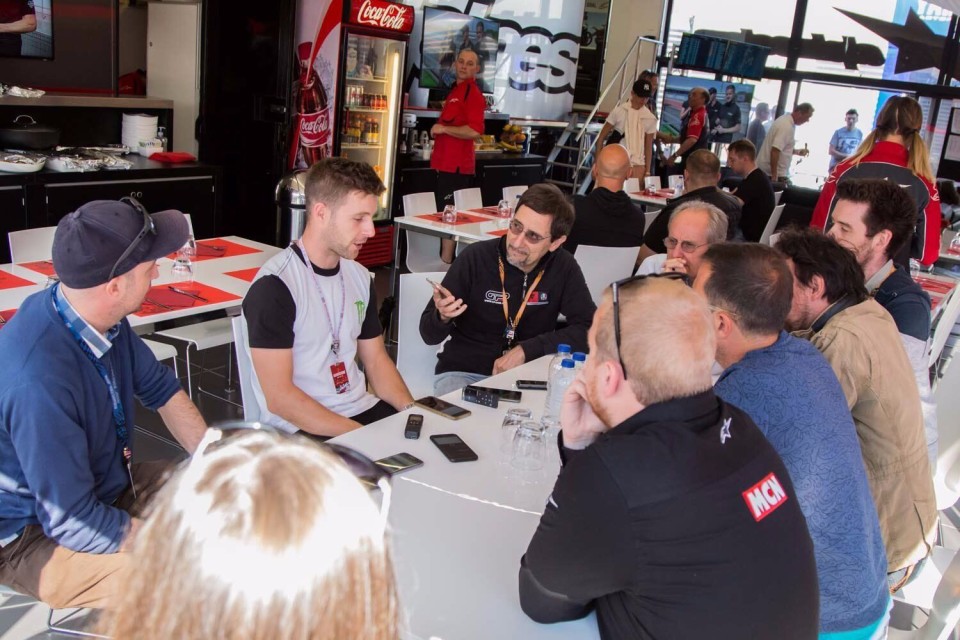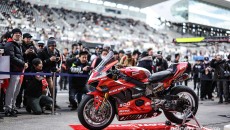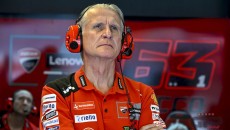Among the many special guests at Silverstone, the most relaxed of all was Kawasaki Superbike number one, Jonathan Rea, having no promotional events to deal with.
The two-time world champion was 'off-duty' in the English paddock and even his accent seemed stronger than it usually does during a race weekend: “it's great to be here - Johnny comments- you can learn a lot from watching these guys ride; the MotoGPs lean more than the Superbikes, though the lap times are pretty similar across the two categories”.
What do you think about the current SBK climate?
“I think that having the races split over two days brings more people to the tracks, especially on Saturday. In Italy, SBK continues to grow, because Mediaset is doing a great job track-side. The problem? The gap between the various manufacturers: Kawasaki and Ducati dominate, the other manufacturers struggle”.
Many are in favour of a regulation that would bring the bikes closer to production machines, but Johnny has a different take on it: “rather than changing the technical regulation each year, trying to bring it closer to production bikes, the manufacturers should be encouraged to invest in SBK, like they do at Suzuka”. Rea has competed in and won the 8 Hours and knows what he's talking about: “ask Bradl, Lowes and Van Der Mark about the differences between the Hondas and Yamahas prepared for the 8 Hours compared to those of the world championship… the Japanese CBRs and R1s are really competitive, because they are officially supported by the respective race departments”.
The Kawasaki rider knows the history of the championship in which he stars: “the only manufacturers who are really there right now in an official capacity are Kawasaki and Ducati - underlines Rea- This category was born from the production bikes and then drastically developed. If we look at the regulations over the years, the SBK we have now is the most standard we've ever had. Foggy's Ducati, the Honda RC45s and VTRs were really special superbikes, race bikes”.
Honda is now suffering in SBK: “but it's difficult to really comment without knowing what's going on inside the company - explains Rea, who raced for the Japanese manufacturer for several years- last year, the CBR Fireblade won at Sepang with Hayden and Van Der Mark scored several podiums. With the new bike, Bradl and Ten Kate are having to learn”.
At the end of 2018, Ducati will leave the twin in favour of the V4; will you still be in SBK or…?
“I have another year with Kawasaki, then I would like a new two-year project”.
The MotoGP paddock respects Rea, deemed a rider who could also be quick with the prototypes: “it's nice to hear this appreciation - admits Johnny- the fastest riders in the MotoGP are the best in the world. To be strong in MotoGP you need the right package, a factory bike and a high-level team, there's no point just being there to make up the numbers. When I stood in for Stoner in 2012 on the Honda HRC I was straight in, having had no time to rest, with the Superbike and then the GP straight after. But I had fun riding what was the best bike at the time at Misano and Aragon, I scored points twice, which was my goal”.
Are you fast enough now to race in MotoGP?
“Honestly, I think I've missed the boat in terms of MotoGP but, looking at Zarco who's 27 and the revelation right now, anything's possible”. In fact… "a rider can now stay fit for longer, because the bikes have electronics that prevent many crashes, the bikes are safer than ever, on the track but also on the road. In the past many riders retired at 35 at the latest, now they can continue on for longer: Valentino Rossi is an example, he's in great shape”.
Valentino, who doesn't ride a bike on the road, only touches scooters; for someone like Rea, who comes from a place where road races represent motorcycle culture, the answer is an unexpected one: “I don't have a bike licence - laughs Johnny- so I don't ride bikes on the road; I'd like to pass my test by the end of this summer, but then I plan to have old style bikes, like the 70s cafè racers. For now, I ride MX bikes in the fields”.
And it's thanks to MX that you learned to start strong…
“The new regulation that reverses the grid for race 2 is an advantage but for and for my bike, which brakes hard and is agile, but this solution doesn't work for everyone. Those making the regulations shouldn't focus on these aspects but should instead improve things in order to level out the competitiveness between the manufacturers”.











